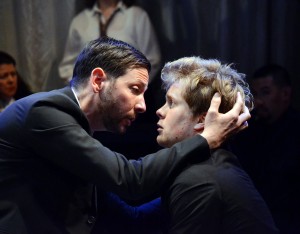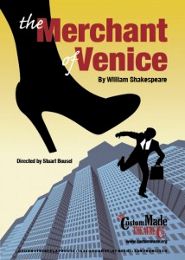THE MERCHANT OF VENICE: AS TRUE NOW AS THEN
Setting Shakespeare’s The Merchant of Venice in the cutthroat world of contemporary finance a la Wall Street is an inspired notion and Custom Made Theatre Co. has produced a timely rendition of a timeless classic that’s creative, just right, and highly satisfying. In this story about the hapless Antonio, the heartless Shylock, and the canny Portia, the quality of the themes in Shakespeare’s pointed comedy are not strained, but made even clearer within the contemporary financial setting. Money and status still warp lives, true friendship is unbreakable, opposites share more in common than they thought they did, love and justice can still triumph in surprising ways, and the battle of the sexes tilts precariously in any century.
 Stuart Bousel’s lighthearted and sincere direction guides the actors in sketching characters straightforwardly and enjoyably, although at times I wondered if actors missed opportunities to explore the deeper levels of personalities and their motivations. However, they beautifully reinforce director Bousel’s goal, implied in his director’s notes, of drawing attention to the class distinctions with which people define or castigate each other, “never realizing how much they sounded like the people they felt had wronged them.”
Stuart Bousel’s lighthearted and sincere direction guides the actors in sketching characters straightforwardly and enjoyably, although at times I wondered if actors missed opportunities to explore the deeper levels of personalities and their motivations. However, they beautifully reinforce director Bousel’s goal, implied in his director’s notes, of drawing attention to the class distinctions with which people define or castigate each other, “never realizing how much they sounded like the people they felt had wronged them.”
 Couples are well-matched and complement each other well: standouts Dashiell Hillman’s sincere Bassanio with Megan Briggs spirited Portia; Matt Gunnison’s breezy Gratiano with Molly Holcomb’s soulful and dedicated Nerissa; and the shared youthful verve of Brian Martin’s Lorenzo and Kim Saunders’ lively Jessica.
Couples are well-matched and complement each other well: standouts Dashiell Hillman’s sincere Bassanio with Megan Briggs spirited Portia; Matt Gunnison’s breezy Gratiano with Molly Holcomb’s soulful and dedicated Nerissa; and the shared youthful verve of Brian Martin’s Lorenzo and Kim Saunders’ lively Jessica.
Catz Forsman renders a compelling Shylock; his gloating avarice and heartless drive to have his bond made me cringe, but when the “learned judge” cleverly turns the tables, leaving him deflated, his downfall is equally captivating. He has some fine moments pointedly debating how a Jew is mortal just like anyone else. While I appreciated his multi-layered acting, strong physicality, chiseled dialect, and detailed mannerisms – like the nervous twitching of his fingers – Forsman unfortunately did not entirely avoid lapsing into stereotype.
 The play’s potentials for humor are not overlooked. Perry Aliado and Stefin Collins drew giggles as Portia’s suitors, respectively the blustery Prince of Monaco and smarmy Prince of Aragon, though they too occasionally seemed to depend more on stylization as opposed to characterization in those moments. Gabriel A. Ross’ animated Launcelot Gobbo was captivating, as well.
The play’s potentials for humor are not overlooked. Perry Aliado and Stefin Collins drew giggles as Portia’s suitors, respectively the blustery Prince of Monaco and smarmy Prince of Aragon, though they too occasionally seemed to depend more on stylization as opposed to characterization in those moments. Gabriel A. Ross’ animated Launcelot Gobbo was captivating, as well.
 There is an initial sense of disconnect when actors in business suits and sharp professional dresses seamlessly render Shakespearean dialect, but the spectacle is so perfectly realized that it seems the play was written for modern times. Tim Malko’s impeccable costumes and Erica Kimble’s resourceful props neatly transported Renaissance Venice into the Information Age (the caskets that Portia’s suitors ponder upon utilize USB thumb drives). Scenic designer Sarah Phykitt’s unobtrusive set, a platform flanked by stair units, may not be a piece of art on its own, but it was creatively backed by silhouettes of skyscraping office buildings and a latticed balcony made of interlaced black ribbon (it was a little distracting to watch actors scuttle up and down the stairs in stiletto heels, but they accomplished that feat very gracefully). The set also provided a means of comment: for example, two Greek-chorus-like office gossips enjoy the salacious details of Shylock’s outrage at daughter Jessica absconding with his ducats and running off to marry a Christian by chatting on cell phones in an “elevator,” enacted by progressing up and down the stairs. Finally they met face to face at the elevator’s destination, still chattering on the cell phones. There were also terrific electronic effects by Ryan Lee Short, such as the enhancement of some plundered ducats. It’s easy to appreciate Custom Made’s business-world vision.
There is an initial sense of disconnect when actors in business suits and sharp professional dresses seamlessly render Shakespearean dialect, but the spectacle is so perfectly realized that it seems the play was written for modern times. Tim Malko’s impeccable costumes and Erica Kimble’s resourceful props neatly transported Renaissance Venice into the Information Age (the caskets that Portia’s suitors ponder upon utilize USB thumb drives). Scenic designer Sarah Phykitt’s unobtrusive set, a platform flanked by stair units, may not be a piece of art on its own, but it was creatively backed by silhouettes of skyscraping office buildings and a latticed balcony made of interlaced black ribbon (it was a little distracting to watch actors scuttle up and down the stairs in stiletto heels, but they accomplished that feat very gracefully). The set also provided a means of comment: for example, two Greek-chorus-like office gossips enjoy the salacious details of Shylock’s outrage at daughter Jessica absconding with his ducats and running off to marry a Christian by chatting on cell phones in an “elevator,” enacted by progressing up and down the stairs. Finally they met face to face at the elevator’s destination, still chattering on the cell phones. There were also terrific electronic effects by Ryan Lee Short, such as the enhancement of some plundered ducats. It’s easy to appreciate Custom Made’s business-world vision.
 Choreographer Daunielle Rasmussen brought interesting touches, including a sprightly introductory ensemble number that seemed at first a little incongruous with Shakespeare, but soon thereafter deftly captured the tone of the story.
Choreographer Daunielle Rasmussen brought interesting touches, including a sprightly introductory ensemble number that seemed at first a little incongruous with Shakespeare, but soon thereafter deftly captured the tone of the story.
This production clearly implies that the quality of mercy need not be strained even in the modern day.
It also provides a fascinating juxtaposition of eras and lifestyles as a backdrop for Shakespeare’s intentions.
photos by Jay Yamada
The Merchant of Venice
The Custom Made Theatre Co. in San Francisco
scheduled to end on August 5, 2012 EXTENDED to August 19, 2012
for tickets, visit http://www.CustomMade.org

